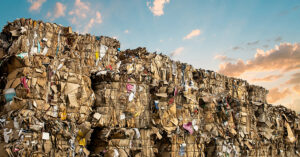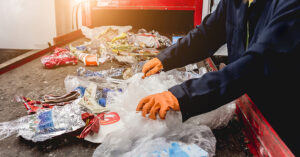Glass waste is a significant concern for many businesses, from restaurants and bars to manufacturing plants and retail stores.
Not only does improper disposal of glass waste pose environmental risks, but it can also lead to increased costs and potential legal issues.
This guide aims to provide businesses with a comprehensive understanding of what to do with glass waste, offering practical strategies and highlighting the importance of proper glass waste management.
Why Proper Glass Waste Management Matters
Environmental Impact
Glass is a non-biodegradable material, meaning it doesn’t break down naturally over time. Without proper recycling, glass waste can remain in landfills indefinitely, taking up valuable space and contributing to environmental degradation.
Recycling glass is crucial as it reduces the need for raw materials, conserves natural resources, and lowers energy consumption in the production of new glass products.
Regulatory Compliance
Businesses must adhere to specific waste management regulations that govern the disposal of glass waste. Failure to comply with these regulations can result in hefty fines and damage to your business’s reputation.
Proper glass waste management ensures that your business stays on the right side of the law while contributing positively to environmental conservation.
Cost Efficiency
Managing glass waste effectively can also lead to significant cost savings. By recycling glass waste, businesses can reduce the amount they spend on waste disposal services.
Additionally, there may be opportunities to sell glass waste to recycling companies, turning what was once a cost into a potential revenue stream.
Types of Glass Waste Generated by Businesses
Common Types of Glass Waste
Businesses generate various types of glass waste, depending on their industry. For example, beverage containers like bottles and jars are common in the hospitality sector, while architectural and automotive glass waste is prevalent in construction and automotive industries.
Additionally, glass packaging from cosmetic and pharmaceutical products contributes to the glass waste stream.
Contaminated vs. Non-Contaminated Glass
It’s essential to distinguish between contaminated and non-contaminated glass waste. Contaminated glass refers to glass that has been mixed with other materials, such as food waste, chemicals, or metals.
This type of glass requires special handling and may not be suitable for standard recycling processes. Non-contaminated glass, on the other hand, is clean and free from foreign materials, making it easier to recycle.
Strategies for Managing Glass Waste
1. Reduce Glass Waste
One of the most effective ways to manage glass waste is by reducing the amount generated in the first place.
- Source Reduction: Businesses can opt for alternative packaging materials that are more environmentally friendly or easier to recycle. Implementing refill programs or purchasing products in bulk can also help reduce the amount of glass waste produced.
- Efficient Usage: Training employees to handle glass items carefully can minimize breakage, while monitoring and optimizing glass usage in production processes can lead to significant reductions in waste.
2. Reuse Glass Waste
Reusing glass waste is another strategy that businesses can employ to reduce their environmental footprint.
- Internal Reuse: Some businesses can repurpose glass containers within their operations, such as using old bottles for storage or decoration. Crushed glass can also be used as an aggregate in construction projects, reducing the need for new materials.
- External Reuse: Businesses can partner with other companies or community organizations to find new uses for their glass waste. For example, donating reusable glass to local artists or community projects can give the material a second life.
3. Recycle Glass Waste
Recycling is perhaps the most well-known method for managing glass waste, but it requires careful planning and the right equipment.
- Sorting and Separation: The first step in recycling glass waste is to sort it by color and type. This helps prevent contamination and ensures that the glass can be processed efficiently. Businesses should establish best practices for sorting glass waste, such as providing separate bins for different types of glass and training employees on proper disposal methods.
- Recycling Process: Once sorted, the glass is collected, crushed, and melted down to create new products. Specialized equipment like balers and crushers can significantly improve the efficiency of this process, making it easier for businesses to recycle their glass waste on-site.
- Benefits of Recycling: Recycling glass not only reduces the need for new raw materials but also saves energy in the manufacturing process. This can lead to lower operational costs and a reduced carbon footprint for your business.
Choosing the Right Equipment for Glass Waste Management
Properly managing glass waste requires the right tools. Investing in specialized equipment can help businesses streamline their waste management processes and maximize the efficiency of their recycling efforts.
Glass Crushers
Glass crushers are the most valuable piece of equipment for businesses looking to manage their glass waste more effectively.
- Advantages of Using a Glass Crusher: Glass crushers reduce the volume of glass waste by up to 80%, making it easier to handle and transport. Crushing glass also prepares it for further processing, such as melting down for recycling.
- Choosing the Right Crusher: When selecting a glass crusher, consider factors like capacity, size reduction ratio, and ease of maintenance. It’s crucial to choose a crusher that can handle the volume of glass waste your business generates while providing reliable performance.
Partnering with Nanoia Recycling Equipment for Glass Waste Solutions
Managing glass waste can be a complex task, but Nanoia Recycling Equipment is here to help. We offer custom solutions tailored to your business’s specific needs, ensuring that you have the right equipment and processes in place to manage your glass waste efficiently.
- Custom Solutions Tailored to Your Business Needs: Our team of experts will work with you to assess your glass waste management requirements and recommend the best equipment and strategies for your business. Whether you need a new baler, crusher, or compactor, we can design, fabricate, and install the perfect solution for your operations.
- Ongoing Support: We don’t just provide equipment; we offer comprehensive support services, including financing options, maintenance, and repairs. This ensures that your equipment continues to perform at its best, helping you manage your glass waste effectively for years to come.
For more information or to discuss your glass waste management needs, contact Nanoia Recycling Equipment today.






